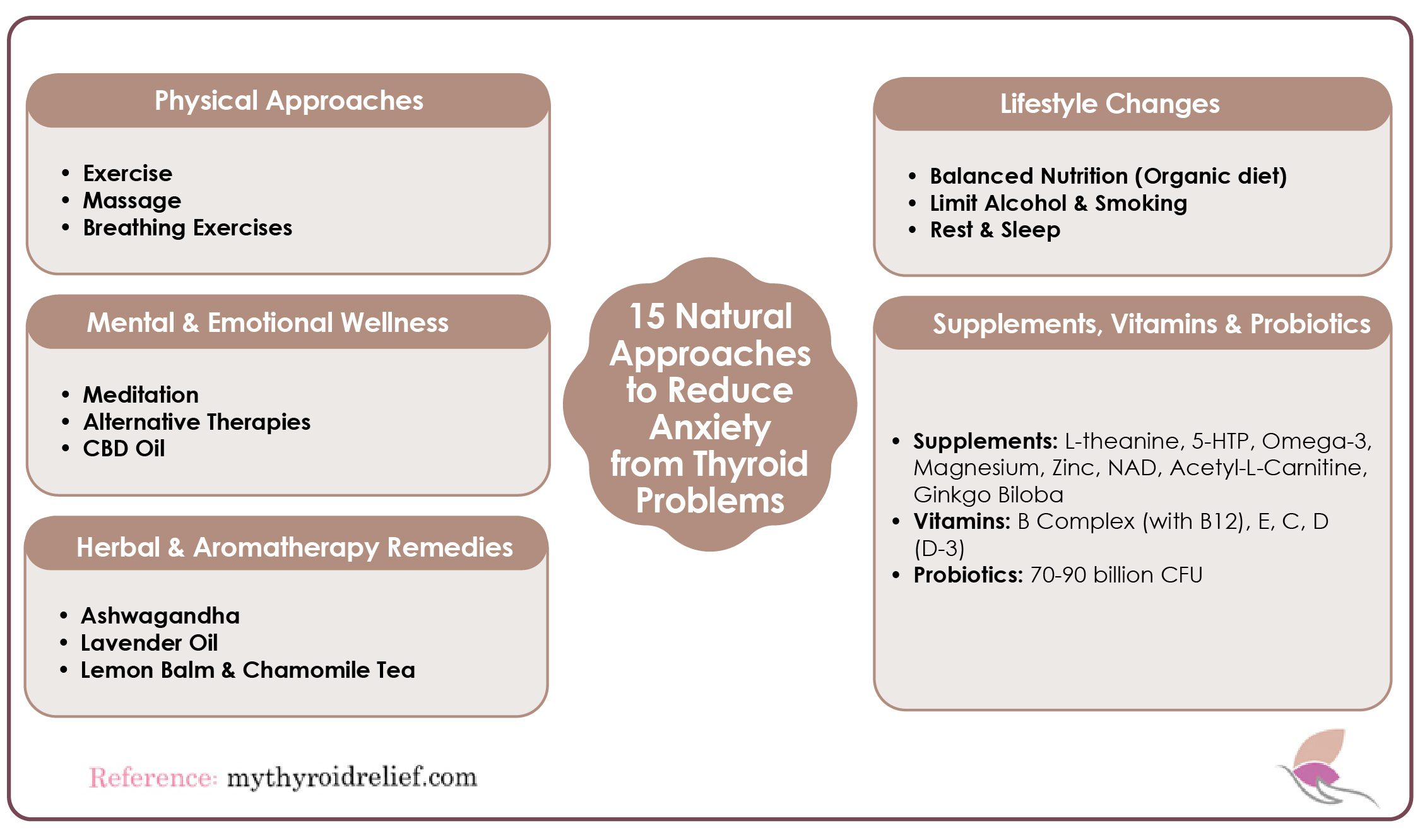
Proper thyroid function is essential for optimal brain function. Disorders of the thyroid gland can have a significant impact on cognitive and emotional well-being. The thyroid plays a crucial role in various brain functions, including memory, mood regulation, and overall mental health. When thyroid hormone levels are imbalanced whether too high (hyperthyroidism) or too low (hypothyroidism) they can disrupt both cognitive and emotional processes, leading to conditions like anxiety, depression, and even more severe psychiatric disorders.
In this article, we will evaluate the connections between thyroid disorders and their effects on both cognitive and emotional health.
Thyroid and Emotional Functions
The thyroid gland has a profound impact on emotional functions. Hormones produced by the thyroid regulate many critical body processes, including mood stabilization. When thyroid hormone levels become unbalanced, individuals may experience a wide range of emotional disturbances. Both hyperthyroidism (overactive thyroid) and hypothyroidism (underactive thyroid) can lead to emotional instability, heightened sensitivity, and mood swings.
Hyperthyroidism is often associated with increased anxiety and restlessness, while hypothyroidism can lead to depression and low energy. Because the thyroid influences how the body uses energy, any disruption in hormone levels affects the brain’s ability to regulate mood and emotions.
1. The Role of Thyroid Health in Managing Anxiety

Anxiety is a natural emotional response to stressors such as work, health, or personal life events. It becomes problematic when it turns into chronic worry or anxiety disorders, which can interfere with daily life and may require treatment. Thyroid imbalances, particularly hyperthyroidism, can exacerbate anxiety. In this condition, the body’s metabolism speeds up, triggering symptoms that mimic anxiety, such as a rapid heartbeat, tremors, and nervousness. When untreated, thyroid-related anxiety can severely disrupt emotional health, leading to persistent fear and emotional exhaustion.
Common symptoms of anxiety include:
- Difficulty sleeping or insomnia
- Trouble concentrating on tasks
- Muscle tension, often leading to discomfort or pain
- Sweating and tremors, especially in stressful situations
- Shortness of breath or feeling like you’re suffocating
- Constant worry or anticipation of disaster, even in low-stress situations
2. Thyroid Imbalances and Their Emotional Impact
Thyroid hormones play a crucial role in regulating the central nervous system, making thyroid dysfunction a common contributor to anxiety symptoms. Both hyperthyroidism (overactive thyroid) and hypothyroidism (underactive thyroid) can lead to anxiety, though the mechanisms differ. In hyperthyroidism, the body’s metabolic rate increases, leading to symptoms like palpitations, sweating, and tremors. These symptoms are often mistaken for anxiety disorders, as they mimic common signs of anxiety. On the other hand, about 40% of individuals with hypothyroidism also experience anxiety-related symptoms, including irritability, nervousness, and difficulty concentrating.
In some cases, thyroid dysfunction can aggravate pre-existing mental health conditions, such as panic attacks, making accurate diagnosis vital for effective treatment.
3. Hyperthyroidism and Panic Disorders
Graves’ disease, a common cause of hyperthyroidism, is closely linked to heightened anxiety and panic attacks. Symptoms such as a rapid heartbeat, sweating, and tremors are often confused with panic disorders, complicating diagnosis. Research has shown that individuals suffering from severe panic attacks often have elevated levels of thyroid-stimulating hormone (TSH), suggesting a strong connection between thyroid function and panic episodes. Managing thyroid health is critical in reducing the severity of these anxiety-like symptoms.
15 Natural Approaches to Reduce Anxiety from Thyroid Problems

Managing anxiety linked to thyroid issues requires a holistic approach that addresses both physical and emotional health. Thyroid imbalances can impact mood and stress levels. This article explores 15 practical strategies to help reduce anxiety and promote overall well-being.
1. Physical Approaches
- Exercise: Regular aerobic exercise increases mood-enhancing neurotransmitters, thus reducing anxiety.
- Massage Therapy: Deep tissue massages release muscle tension and improve circulation, alleviating anxiety symptoms.
- Breathing Exercises: Deep breathing techniques regulate the body’s response to anxiety and stress.
2. Mental and Emotional Wellness
- Meditation: Mindfulness meditation, practiced for just 30 minutes a day, improves emotional well-being and reduces anxiety, therefore promoting overall mental health.
- Breathing Exercises: Deep breathing techniques help regulate the body’s natural response to anxiety and stress, resulting in a calmer state of mind.
- Alternative Therapies: Acupuncture, yoga, and mindfulness practices promote relaxation and reduce anxiety related to thyroid imbalances, which can also improve emotional balance.
- CBD Oil: When used under medical supervision, cannabidiol (CBD) oil can relieve stress and anxiety, helping to restore emotional equilibrium.
3. Herbal and Aromatherapy Remedies
Using herbs and aromatherapy can support the body’s ability to cope with stress and anxiety:
- Ashwagandha (Adaptogenic herb): Known for its stress-reducing properties, it helps lower cortisol levels and promotes a sense of calm and relaxation, thus helping to cope with stress and anxiety.
- Lavender Oil: Calms nerves and improves sleep when inhaled or applied topically.
- Lemon Balm: Reduces stress and promotes relaxation when consumed as tea or a supplement.
- Chamomile Tea: A caffeine-free herbal remedy with calming effects, aiding in anxiety reduction and better sleep.
4. Lifestyle Changes
- Balanced Nutrition: An organic diet rich in organic whole foods, including fruits, vegetables, and grass-fed lean proteins, stabilizes mood and boosts emotional health, leading to a more balanced emotional health.
- Limit Alcohol and Smoking: Eliminating alcohol and nicotine is essential for reducing anxiety, improving memory and mood, alleviating stress and depression, and supporting the immune system and heart health.
- Rest and Sleep: Adequate rest (7-9 hours of sleep per night) reduces stress and anxiety.
5. Supplements, Vitamins, and Probiotics:
Certain supplements like L-theanine, 5-HTP, B complex (with B12), omega-3 fatty acids, magnesium glycinate, zinc, copper, NAD, acetyl-L-carnitine, Ginkgo biloba, vitamin E, and vitamin C can support neurotransmitter regulation, enhance brain function, and help reduce anxiety. For probiotics, look for those with 70-90 billion CFU (colony-forming units) to promote gut-brain health and improve emotional well-being. These can help balance gut flora, which is crucial for mental health.
The Link Between Thyroid problems and cognitive functions

Thyroid hormones, specifically T4 (thyroxine) and T3 (triiodothyronine) are essential for physical health and cognitive functions like concentration and memory. These hormones regulate brain activity, ensuring proper communication between nerve cells. When thyroid hormone levels are imbalanced due to thyroid dysfunction, it can significantly impact mental clarity, focus, and cognitive performance.
One of the earliest and most noticeable cognitive signs of thyroid problems is a decline in concentration. Individuals with hypothyroidism (underactive thyroid) often experience sluggish thinking, where thoughts seem to move more slowly than usual. This can make it difficult to follow conversations or maintain attention during tasks. Common symptoms include:
- Sluggishness and an inability to focus (especially in hypothyroidism)
- Memory lapses and forgetfulness
- Difficulty processing information or recalling recent events
In contrast, hyperthyroidism (overactive thyroid) presents challenges with concentration due to overstimulation of the brain. The excessive thyroid hormones can cause nervousness, anxiety, and even insomnia, all of which negatively affect the ability to focus. This mental overstimulation leads to a scattered thought process and an inability to concentrate on one task at a time.
For those with hypothyroidism, the brain fog and memory issues can sometimes mimic early signs of dementia, but these symptoms are usually reversible once thyroid levels are properly managed. Both conditions highlight the critical role that thyroid health plays in maintaining mental focus and cognitive efficiency.
9 Strategies To Improve Your Memory If You Have Hypothyroidism

Cognitive difficulties, particularly memory problems, are common in individuals with hypothyroidism. The good news is that there are several strategies to improve memory and mental clarity when dealing with an underactive thyroid:
1. Exercise Regularly: Physical activity increases blood flow to the brain, enhancing cognitive function and memory. Even moderate activities like walking can boost brain power and improve recall abilities.
2. Follow a Routine: A consistent daily schedule helps minimize forgetfulness. Keeping your environment organized also reduces distractions, making it easier to focus on important tasks.
3. Repeat Important Details: Repetition is key to memory retention. Writing down essential information and repeating it aloud strengthens the brain’s ability to retain and recall these details.
4. Focus on One Task at a Time: Multitasking can increase stress and make memory lapses more likely. Prioritize single tasks to improve concentration and enhance memory.
5. Engage in Mental Exercises: Cognitive exercises like Sudoku, crossword puzzles, or memory games help challenge the brain, improving mental agility and boosting memory over time.
6. Sleep Well: Quality sleep is essential for memory consolidation. A restful night helps the brain process and store new information, reducing the impact of brain fog.
7. Eat a Balanced Diet: Proper nutrition, including an organic diet rich in antioxidants, vitamins, and hydration, supports brain health and improves mental sharpness.
8. Take Thyroid Medications: Taking thyroid medications as prescribed is vital for managing cognitive symptoms. Medication helps restore hormone balance, aiding memory recovery. Check if you have a conversion problem from T4 to T3, and consider adding a T3 to your T4 medication.
9. Socialize: Engaging in social activities boosts mood, prevents depression, and sharpens mental abilities. Regular social interaction can improve cognitive function over time.
How Thyroid Disorders Affect Mood: Depression and Mood Swings
Thyroid disorders can have a significant impact on mood and emotional well-being. The thyroid gland regulates hormone production, which affects the brain’s chemistry and emotional balance. When thyroid hormones are out of balance, both hypothyroidism and hyperthyroidism can lead to emotional disturbances, including mood swings and depression.
1. Hypothyroidism and Depression: Hypothyroidism, or an underactive thyroid, is commonly linked to depressive symptoms. Reduced thyroid hormone levels slow down the body’s metabolism and brain function, leading to fatigue, low energy, and feelings of hopelessness. People with hypothyroidism may experience persistent sadness, lack of interest in daily activities, and difficulty concentrating—common signs of depression. In some cases, hypothyroidism-related depression can be severe if left untreated, but hormone therapy often brings significant emotional improvement.
2. Hyperthyroidism and Mood Swings: On the other hand, hyperthyroidism, or an overactive thyroid, can lead to irritability, nervousness, and extreme mood swings. The body’s heightened metabolism due to excess thyroid hormone causes feelings of anxiety, restlessness, and irritability. Individuals with hyperthyroidism often feel overwhelmed or agitated, and this emotional volatility can strain relationships and daily life. In more severe cases, hyperthyroidism may also contribute to panic attacks or intense emotional outbursts.
3. Managing Mood Changes: Early diagnosis and proper management of thyroid conditions are crucial for restoring emotional balance. With the right thyroid hormone treatment and emotional support, most people experience improved mood stability, reduced irritability, and a better overall sense of well-being.
Conclusion
Thyroid health is crucial for both cognitive and emotional stability. Imbalances in thyroid hormones can cause issues such as memory loss, brain fog, anxiety, and depression. Whether it’s hypothyroidism or hyperthyroidism, early diagnosis and treatment are essential for restoring mental clarity and mood balance. Proper management, including thyroid medications, lifestyle changes like regular exercise, a balanced diet, and stress reduction, can improve overall well-being.
By addressing thyroid dysfunction early and holistically, individuals can significantly reduce the mental and emotional challenges associated with thyroid disorders, leading to a healthier, more balanced life.
References
https://www.btf-thyroid.org/psychological-symptoms-and-thyroid-disorders
https://karger.com/nen/article/112/9/835/825411/Thyroid-Disorders-and-Development-of-Cognitive
https://pmc.ncbi.nlm.nih.gov/articles/PMC4264616/
https://jamanetwork.com/journals/jamainternalmedicine/fullarticle/2783799
https://www.sciencedirect.com/science/article/abs/pii/S0378512215006064
Pretty! This was an incredibly wonderful post. Many thanks for providing this information.
Hi Brendon,
Thank you! I’m glad you found the post helpful. If you have any questions or need further information, feel free to ask.
Great info. Lucky me I discovered your site by accident (stumbleupon). I have book marked it for later!
Hi Gail,
Thank you! I’m glad you found the information helpful. Feel free to explore more of our site whenever you like.